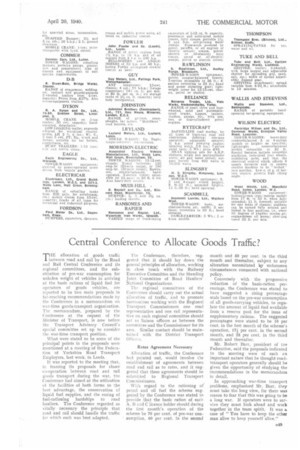Central Conference to Allocate Goods Traffic?
Page 67

If you've noticed an error in this article please click here to report it so we can fix it.
T.IIE allocation of goods traffi,-; between road and rail by the Road and Rail Central Conference and its regional committees, and the substitution of pre-war consumption for unladen weight of vehicles in arriving at the basic rations of liquid fuel for operators of goods vehicles, are reported to be two main proposals in far-reaching recommendations made by the Conference in a memorandum on war-time goods-transport organization. The memorandum, prepared by the Conference at the request of the Minister of Transport, is now before the Transport Advisory Council's special committee set up to consider the war-time -transport position.
What were stated to be some of the principal points in the proposals were mentioned at a meeting of the Federation of Yorkshire Road Transport Employers, last week, in Leeds.
It was reported to the meeting that, in framing its proposals for closer co-operation between road and rail goods transport during the war, the Conference had aimed at the utilization of the facilities of both forms to the best advantage, the conservation cf liquid fuel supplies, and the easing of fuel-rationing hardships to road hauliers. The Conference regarded as vitally necessary the principle that road and rail should handle the traffic for which each was best adapted. The Conference, therefore, suggested that it should lay down the general principles of allocation, working in close touch with the Railway Executive Committee and the Standing Joint Committee of Road Hauliers' National Organizations.
The regional committees of the Conference should carry out the actual allocation of traffic, and to promote harmonious working with the Regional Transport Commissioners one road representative and one rail representative on each regional committee should act as liaison officers as between the committee and the Commissioner for its area. Similar contact should he maintained with the District Transport Offic re.s.
Rates Agreement Necessary Allocation of traffic, the Conference had pointed out, would involve the establishment of agreements between road and rail as to rates, and it suggested that these agreements should be submitted to Regional Transport Commissioners.
With regard to the rationing of' petrol and oil fuel the scheme suggested by the Conference was stated to provide that the basic ration of each A, B and C licence holder should during the first mouth's operation of the scheme be 70 per cent. of pre-war consumption, 60 per cent. in the second month and 50 per cent, in the third month and thereafter, subject to any alteration necessitated Iv unforeseen circumstances connected with national policy.
Conversely with the progressive reduction of the basic-ration percentage, the Conference was stated to have suggested a rising percentage scale based on the pre-war consumption of all goods-carrying vehicles, to regulate the amount of liquid fuel available from a reserve pool for the issue of supplementary rations. The suggested percentages were stated to be 10 per cent, in the first month of the scheme's operation, 17i per cent. in the second month, and 25 per cent, in the third month and thereafter.
Mr. Robert Barr, president of the Federation, said the proposals indicated to the meeting were of such en important nature that he thought road. transport operators generally should be given the opportunity of studying the recommendations in the memorandum in detail.
In approaching war-time transport problems, emphasized Mr. Barr, they must take the long view, for there was reason to fear that this was going to be a long war. If operators were to survive they must look ahead and work together in the team spirit. It was a case of "You have to keep the other man alive to keep yourself alive."




































































































